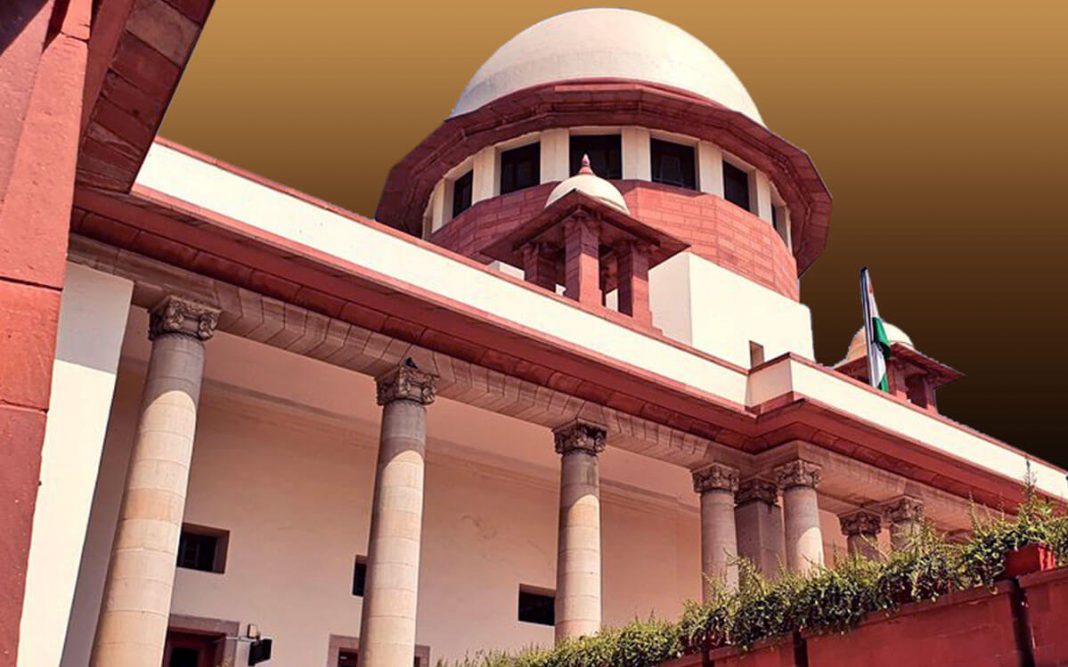The Supreme Court on Tuesday reserved its order on a plea seeking a stay on the release of a fresh set of electoral bonds ahead of the assembly elections in West Bengal, Tamil Nadu, Kerala, Assam and Puducherry.
The bench of Chief Justice S.A. Bobde, Justices A.S. Bopanna and V. Ramasubramanium heard the application filed by NGO Association for Democratic Reforms (ADR).
Advocate Prasant Bhushan, representing ADR, pointed out that the Reserve Bank of India as well as the Election Commission of India had raised objections over the current Electoral Bond Scheme and written to the government expressing their concern.
Bhushan then pointed out the following flaws in the current Electoral Bond System:
a. Electoral bonds are like currency notes which dilutes the monopoly of the Reserve Bank of India.
b. Electoral bonds have opened the way for large corporations where they can give bribes to the ruling party anonymously because in return, they get favours from the government. Earlier, there was a rule that only 7.5% of the profit can be donated by corporations to parties. But with the amendment this rule has been deleted and another added which permits foreign corporate houses to make donations provided they have their subsidiaries in India.
c. Electoral bonds promote forgery, cross-border smuggling of counterfeited currency, money laundering through shell companies and, moreover, it promotes bribery.
d. Money given to political parties through electoral bonds promotes terrorism because there are many political parties which have violence in their agenda.
e. Since neither the purchaser of the bond nor the political party receiving the donation is required to disclose the donor’s identity, voters will have no idea of how, and through whom, a political party has been funded.
f. Only the government is always in a position to know who the donor is because the bonds are purchased through the SBI. Therefore, this will lead to victimization of donors who have donated to the other parties other than the ruling party.
After listening to Bhushan’s arguments, Chief Justice Bobde remarked, “If your arguments are correct, then we will have to strike down the law.” To which, he replied, “Of course Milord”. The CJI Bobde asked “How can it be done through an interim order?”
Advocate Prasant Bhushan then clarified that, “We are only seeking a stay on a fresh tranche of bonds that are proposed to be sold from next week, ahead of assembly polls in West Bengal, Kerala, Tamil Nadu, Assam, Puducherry etc.” Then CJI Bobde said, “Isn’t this question more on Political Morality? Was it not considered earlier in R.K. Garg Vs. Union Of India?”
To which, Advocate Prasant Bhushan replied, “It is not a question of political morality rather it is a question of Democracy. The electors have the right to know the source and background of the funding which the political parties are getting so that there must be transparency in the electoral process.”
Thereafter, CJI sought replies from Attorney General K.K. Venugopal on the above mentioned issues of the petitioner. He submitted that this present Law of Electoral Bonds has been carefully devised by the earlier finance minister Arun Jaitley to eradicate the evil of Black money, and he made the following arguments:-
a. That the issuance of Electoral Bonds helps to curb the problem of Black Money in the country because when a person make a donation by way of Electoral Bonds, he goes to the authorized State Bank of India and purchases the bond by way of Cheque or Demand Draft and the bank issues the bond only after complying the norms of “KYC” i.e (Know your Customers norms) in this way electoral bonds would keep a tab on the use of black money for funding elections. In the absence of electoral bonds, donors would have no option but to donate by cash after siphoning off money from their businesses.
b. The political party which is registered under Section 29A of The Representation of The People Act, 1951 can only encash the Electoral Bond within the time limit of 15 days.
c. It has also been made compulsory for the political parties to file the Income Tax return which makes them accountable for every single penny they get by way of electoral bonds.
In the meanwhile, Chief Justice Bobde expressed concern at the possible misuse of electoral bonds, saying, “We don’t want to get into the political arena. But let’s say if a party receives Rs 100 crore by way of electoral bonds what is the guarantee that such money will not be used to fund protests, which can later on turn violent.”
He added, “Such money can be also used to fund terrorism in the country because I am sure there are some political parties which have terrorism in their agenda.”
Attorney General Venugopal replied, “Terrorism can only be promoted by the black money and not by the white money and the present system of electoral bonds eliminates the black money from the country.”
Advocate Rakesh Dwivedi, representing the Election Commission, submitted, “Without electoral bonds, we will go back to the earlier cash system, which was unaccounted. The Electoral Bond system is one step forward, as all transactions are through banking channels.”
He added that, “We want transparency, but that is the matter of final hearing.” “We are against the stay of electoral bonds as of now because if we stay, we will go back to the unaccounted cash system.”
Read Also: SCBA to write to CJI again on SOP, advocates to march to India Gate on March 25 evening
In its PIL, the NGO had sought that the amendments carried out to the Finance Act be struck down. The ground cited in the petition is that the scheme lacks transparency and the donations made by the way of electoral bonds enjoy 100% tax exemption as they need not be reported to the Income Tax department either.
The electoral bond scheme was notified by the Central Government on January 2, 2018.


